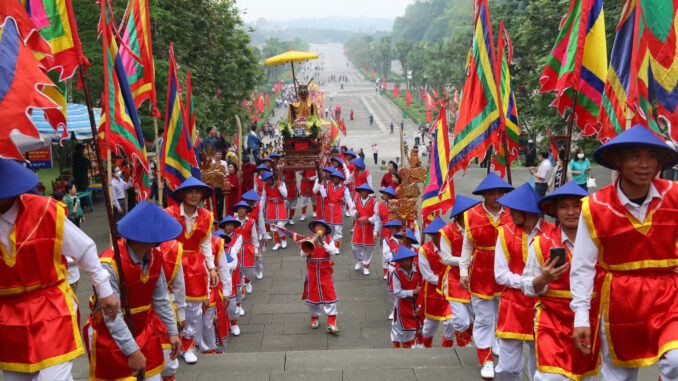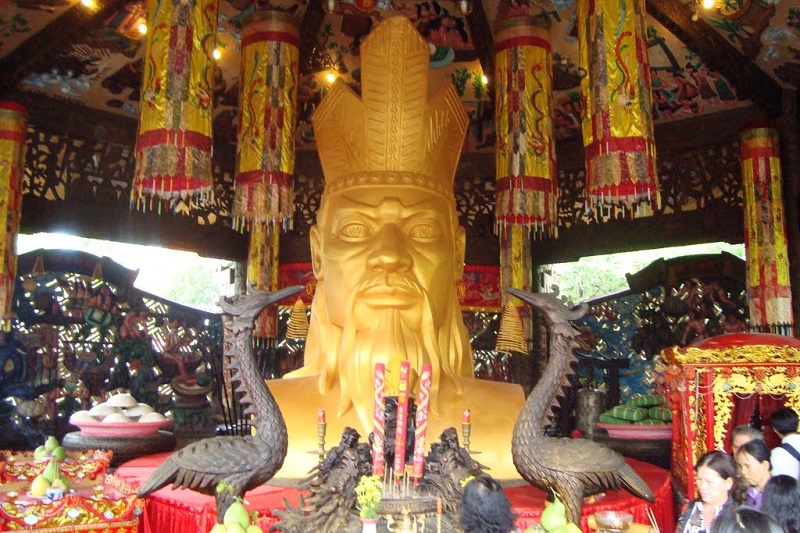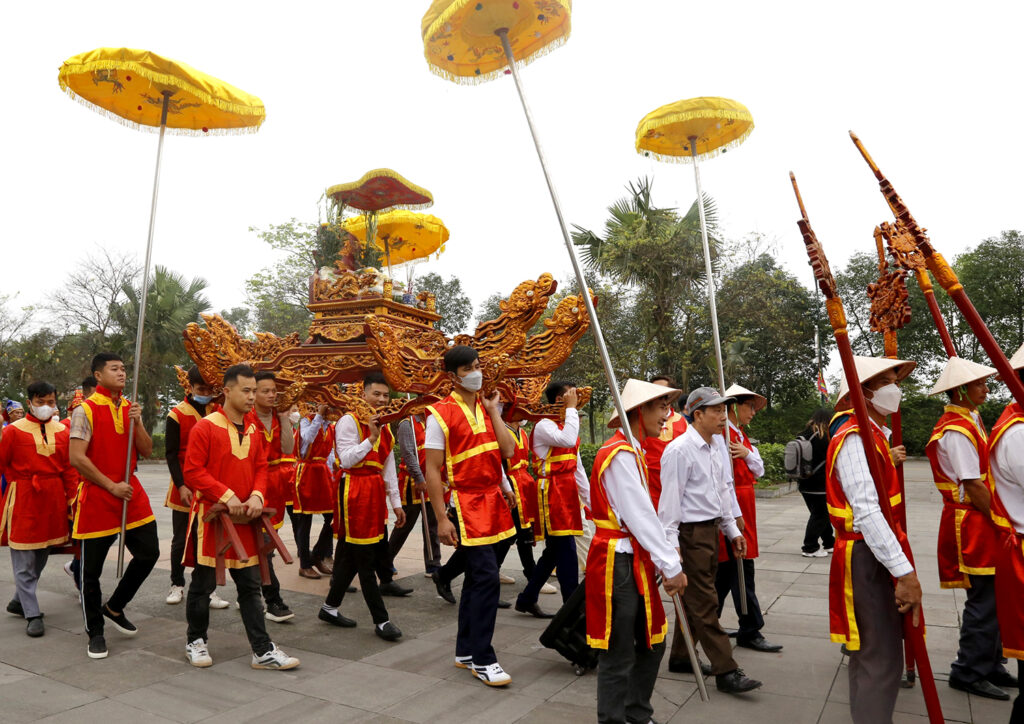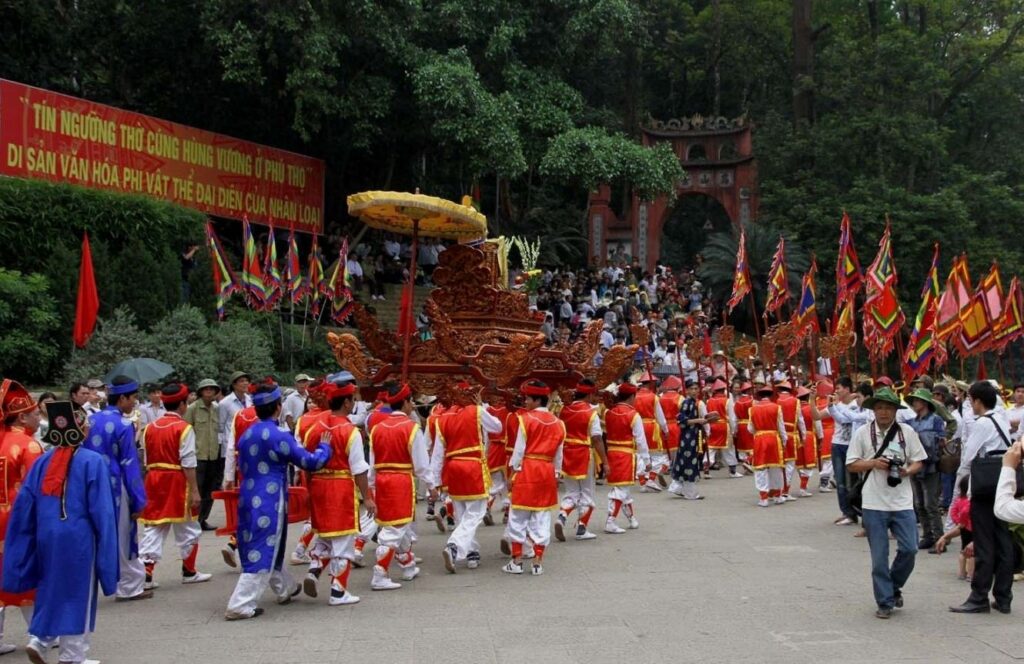
The process of formation and development of the Land of the Ancestors had impacts on the formation of the belief in worshiping the Hung Kings, and the origin is the ancestor worship belief of the Vietnamese people.
The belief of worshiping Hung Kings is a form of expressing people’s belief in the presence of Hung Kings. It is a basic, popular belief, meeting the spiritual needs of Vietnamese people at home and overseas Vietnamese.
Origin of Worship Hung King
Phu Tho province is known as the residence of primitive people, ancient Vietnamese people, in the midland hills and mountains of Northern Vietnam, and is also the cradle of wet rice civilization and Vietnamese national culture. Due to its geocultural position, during the process of formation and development from ancient times to the present, Phu Tho has always been considered a sacred land, where the Hung Kings built the Van Lang State – the first state of Vietnam, the capital stationed in Phong Chau.
Value of national education
The merits of the Hung Kings are passed down from generation to generation and are worshiped and grateful by the community as symbols of founding heroes. This is the source of the patriotic spirit of the Vietnamese people. The awareness of the Hung Kings is also the awareness of the origin of the nation and country, from which the spirit of national self-reliance and sense of independence and self-reliance is formed.

Our nation has gone through the ups and downs of many wars, but the patriotism and sense of independence and self-reliance enjoyed by successive generations of Vietnamese people have never been extinguished, creating a unique and outstanding value in the value system morality of Vietnamese people.
Value of spiritual culture
In Hung Vuong Worship, spiritual cultural elements are hidden from the religious architecture of communal houses, temples, and shrines – places of worship and religious practice to the rituals of procession, sacrifice, offerings, and gifts. costumes, folk performances.

Every year, millions of people make pilgrimages to the sacred mountain of Nghia Linh to commemorate Hung King, thank their ancestors for building and defending the country, and pray for good rain, good winds, good harvests, good luck and health for yourself and your family. Pilgrimages to the past and communication with the ancestors of the nation and family are forms of connecting with the power of the ancestors as a means of meeting and overcoming the challenges of the present life.
From the Vietnamese community in Phu Tho, the belief in Hung King worship spread throughout the country, becoming a practice of the Vietnamese community inside and outside. Vietnamese people in all parts of the country and abroad created their own spaces to worship Hung King and asked for incense sticks, soil, and water from Hung Temple to worship him as the nation’s Patriarch. This is a pure Vietnamese faith that has transcended all eras to become a symbol of lasting aspirations, long-term, permanent independence and autonomy, and the dream of prosperity for the nation and people.
Value of history
The belief in worshiping Hung Kings shows pride in the nation’s roots and people’s awareness of history – an ideology as profound as the wisdom passed down by their ancestors until today. The tradition of worshiping the Hung Kings is a form of strong expression of awareness of the history and solidarity of the Vietnamese people, deeply inspiring the people’s reverence for their ancestral past and cultural heritage. featured.
The worship of Hung Vuong is an interwoven process of historicization and mythification. The system of archaeological sites at Son Vi, Phung Nguyen, Lang Ca, Xom Ren, and Go Mun, and antiques found around Hung Mountain such as Nha Chuong, bronze drums, sticks, and arrows… shows us Hung King era was brilliant and clearly showed the ancient Van Lang state – the center of origin of the ancient Vietnamese people.
Hung Kings Commemoration Day
To commemorate the contributions of Hung kings to building the country, Vietnam has celebrated a day called “Hung Kings Commemoration Day” on the 10th day of the third lunar month every year.
Activities
There will be 2 ceremonies held at Hung Temple
– King’s palanquin procession: The palanquin procession with many flags, flowers, parasols, palanquins, and traditional costumes will start from the foot of the mountain and then pass through the temples to the Thuong temple.

– Incense offering ceremony: Pilgrims will go to Hung Temple to burn incense. Each person lit a few incense sticks when arriving at the ancestral land. According to Vietnamese beliefs, every handful of soil and tree stump here is sacred and the tree stumps and rock holes are filled with red incense sticks.
There are also many folk games here: Xoan singing competition, a special form of folk song of Phu Tho, wrestling competitions, tug-of-war competitions, and swimming competitions at the Bach Hac River confluence, where the Hung Kings lived. training naval troops for battle.
Conclusion
The worship of Hung Kings was registered by UNESCO as an Intangible Cultural Heritage of Humanity on December 6, 2012. This is to promote the unity in cultural diversity of the Vietnamese ethnic community.
Vietnam is the only country in the world to practice ancestral worship which has been maintained for thousands of years. This treasure heritage represents Vietnam’s ancestral culture and the power of great national unity.
In addition, Hung Kings Commemoration Day – Hung Temple Festival is an important opportunity for us to promote to the world an extremely valuable and unique Heritage that has existed for thousands of years and is deeply rooted in the soul sentiment that has become the traditional morality of our compatriots across the country and our compatriots abroad.
Get an opportunity to visit Intangible World Cultural Heritage in Vietnam through Vietnam E-Visa!